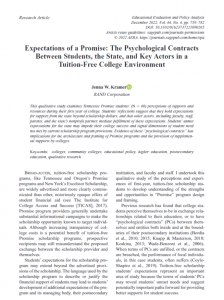
Author: Jenna W. Kramer
Published: May 30, 2022
Abstract: This qualitative study examines Tennessee Promise students’ (N = 60) perceptions of supports and resources during their first year of college. Students’ reflections suggest that they hold expectations for support from the state beyond scholarship dollars, and that other actors, including faculty, staff, parents, and the state’s nonprofit partner, mediate fulfillment of these expectations. Students’ unmet expectations for the state may impede their college success and signal dimensions of student need not met by current scholarship program provisions. Evidence of these “psychological contracts” has implications for the architecture and framing of Promise programs and the provision of supplemental supports by colleges.
Read the ResearchAuthor: Jenna W. Kramer
Published: March 4, 2020
Abstract: Technology-facilitated interventions following high school graduation have shown promise for increasing the likelihood of college matriculation, but we know little about how to fine-tune these tools. I conducted an experiment in which college-intending Tennessee high school graduates received informational messages in distinct behavioral frames: business-as-usual, in which they received the same messages as the prior cohort; loss aversion, which emphasized what students would lose if they did not act; reduction of ambiguity, which provided details on necessary actions and anticipated completion times; and peer support, which encouraged students to work with friends on enrollment tasks. There was no main effect of the treatment frames. Heterogeneity analyses suggest that, at certain eligibility checkpoints, a loss aversion frame may negatively affect men and the peer support frame may negatively affect first-generation and Black participants. I situate the findings in the literature and recommend future directions for research on informational intervention delivery.
Read the Research